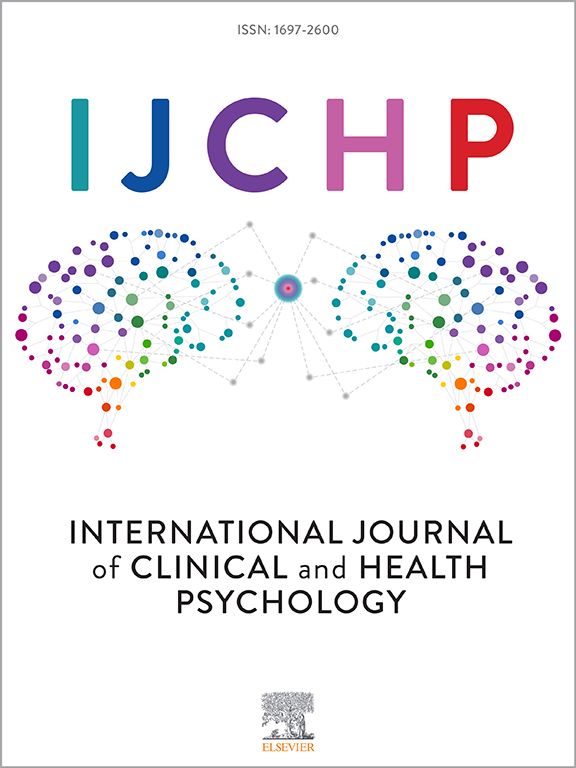智障人士良好心理健康的概念化:一项包容性德尔菲研究
IF 4.4
1区 心理学
Q1 PSYCHOLOGY, CLINICAL
International Journal of Clinical and Health Psychology
Pub Date : 2025-06-28
DOI:10.1016/j.ijchp.2025.100601
引用次数: 0
摘要
目前,对于智障人士(ID)来说,良好的心理健康并没有概念化。为了在这一人群中形成对良好心理健康的初步共识,进行了一项包含两轮调查的德尔菲研究。方法采用德尔菲法,第一轮共60人,第二轮共53人。总共包括23名ID专家和37名心理健康专家。德尔菲问卷采用通用设计,最大限度地提高了有或没有身份证的专家的可访问性。参与者被要求评价每个项目与ID患者良好心理健康的相关性。在整个研究过程中,ID患者都是共同研究人员。结果在两轮调查中,所有项目均被评为ID患者良好心理健康的重要因素(加权中位数≥3 / 5)。在结构综合中,以下因素被认为是重要的:(1)成为社区的一部分,(2)充分的支持,(3)社会接触,(4)沟通,(5)工作和生活环境,(6)保持身体健康,(7)无精神障碍,(8)保健,(9)心理社会功能。作为最广泛的主题,心理社会功能包括六个副主题,如情绪、自主和自我概念,以及做有意义的事情。结论本研究为建立对ID患者良好心理健康的包容性理解提供了基础。共同研究人员的积极参与强调了参与式方法在形成研究成果方面的价值。本文章由计算机程序翻译,如有差异,请以英文原文为准。
Conceptualising good mental health for people with intellectual disabilities: An inclusive delphi study
Background
Currently, there is no conceptualisation of good mental health for people with intellectual disabilities (ID). To develop an initial shared understanding of good mental health in this population, an inclusive Delphi study with two survey rounds was conducted.
Methods
The Delphi study comprised a total of N = 60 participants in the first round, and 53 in the second round. In sum, 23 experts with ID and 37 mental health experts were included. The Delphi questionnaire applied a universal design, maximising accessibility for experts with and without ID. Participants were asked to rate the relevance of each item for good mental health of people with ID. People with ID served as co-researchers throughout the research process.
Results
In both survey rounds, all items were rated as important for good mental health of people with ID (weighted median ≥ 3 out of 5). In a structural synthesis, the following factors were found to be important: (1) being part of the community, (2) adequate support, (3) social contacts, (4) communication, (5) working and living environment, (6) keeping the body healthy, (7) no mental disorders, (8) healthcare, (9) psychosocial functioning. As the broadest theme, psychosocial functioning included six subthemes, such as emotions, autonomy and self-concept, and doing something meaningful.
Conclusions
This study provides a foundational step towards developing a more inclusive understanding of good mental health for people with ID. The active involvement of co-researchers underscores the value of participatory methods in shaping research outcomes.
求助全文
通过发布文献求助,成功后即可免费获取论文全文。
去求助
来源期刊

International Journal of Clinical and Health Psychology
PSYCHOLOGY, CLINICAL-
CiteScore
10.70
自引率
5.70%
发文量
38
审稿时长
33 days
期刊介绍:
The International Journal of Clinical and Health Psychology is dedicated to publishing manuscripts with a strong emphasis on both basic and applied research, encompassing experimental, clinical, and theoretical contributions that advance the fields of Clinical and Health Psychology. With a focus on four core domains—clinical psychology and psychotherapy, psychopathology, health psychology, and clinical neurosciences—the IJCHP seeks to provide a comprehensive platform for scholarly discourse and innovation. The journal accepts Original Articles (empirical studies) and Review Articles. Manuscripts submitted to IJCHP should be original and not previously published or under consideration elsewhere. All signing authors must unanimously agree on the submitted version of the manuscript. By submitting their work, authors agree to transfer their copyrights to the Journal for the duration of the editorial process.
 求助内容:
求助内容: 应助结果提醒方式:
应助结果提醒方式:


